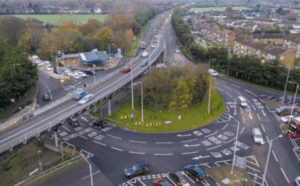Seventy-nine projects on London’s road network have been supported so far by Transport for London’s Lane Rental scheme, making a ‘real difference’ to disruption, according to the organisation.
Repairs and maintenance on underground pipes can have a significant impact on the road network leading to road closures and congestion. Since Lane Rental was introduced in 2012, there has been a 31% increase in companies working at the same site, at the same time, and a 30% rise in planned utility works at night.
TfL has recently modernised its Lane Rental scheme, which aims to reduce this disruption by charging utility companies a daily fee for digging up the busiest sections of London’s roads and pavements at the busiest times. The funding is then available to help find new ways of making London’s roads more efficient by reducing delays caused by utility works and other road works.
TfL extended the scheme in May to charge for roadworks on 20 of the capital’s footways, charging £350 per day for works that have an impact on the busiest areas of pavement in the capital, to minimise disruption to people walking. This, alongside initiatives like the Mayor’s Infrastructure Coordination Service, are delivering on the Mayor’s commitment to reduce road network disruption.
The scheme recently part funded a project with Thames Water to trial innovative new Die Draw technology on Seven Sisters Road as an alternative method to replacing the road’s water main. The technology uses a special thermoplastic material to create a new lining within an existing pipe that has leaks. This method significantly reduces the number of holes that need to be dug on a road to reach the water main, further decreasing traffic and pedestrian disruption. On Seven Sisters Road, over 500m of pipework has been replaced using a small number of excavations, causing less traffic disruption than a full pipe replacement.
Other projects to receive funding from Lane Rental include:
- The creation of an augmented reality mapping application to display underground abandoned mains and spare infrastructure, so that they can be used by the industry to avoid digging up the road when laying new apparatus
- The development of an AI-powered disruption-detection engine that proactively spots and identifies issues by sifting through social media posts generated about traffic in London
- The testing of a multi-sensor inspection survey robot for use on large sewers to determine levels of deformation, corrosion and sediment build-up without excavation
- Trialling the use of tarmac that uses recycled plastic pellets to strengthen road surfaces and increase longevity
Glynn Barton, TfL’s Director of Network Management, said: “London’s road network plays an absolutely vital role in keeping the capital moving and we’re working closely with utility companies to see how we can reduce the impact of roadworks. The use of innovative new technology could make a real difference in reducing delays on our roads, cutting congestion and the pollution it can cause. We’ll carry on working closely with the industry to ensure an even cleaner and more sustainable road network can continue to play a role in the capital’s recovery from the pandemic.”
Steve Spencer, Thames Water Operations Director, said: “Reducing leakage is one of our most important priorities but sometimes this means fixing pipes on busy roads in the capital and we recognise this can be disruptive to our customers and road users. By investing in new technology to replace these pipes, some of which are from the Victorian and Edwardian eras, we can help reduce the impact of our roadworks and ensure we protect London’s water supply for future generations.”
More than £25m in Lane Rental funding has been allocated to 79 schemes that aim to improve how roadworks are carried out. Thames Water has received £1.8m of the share to deliver 15 projects, including a £350,000 contribution towards strengthening the King’s Scholars Pond trunk sewer by inserting an innovative new lining in the 170-year-old structure that runs beneath the Marylebone Road and Baker Street junction.
Last year, SGN gas distribution company was presented with an award for ‘Best use of Lane Rental Funding to Deliver Innovation’ at TfL’s Roadworks Charter award ceremony. They have received £1.6m to deliver seven highly innovative projects, including £135,000 for a device that removes the need for hand digging in the vicinity of live utility services. Another gas operator, Cadent, has benefited from £762,000 of funding for 10 projects, including £70,000 for trialling an environmentally friendly digitised information board that provides the travelling public with real-time updates on how works are progressing.
The Lane Rental scheme is one of the many ways TfL is working to deliver the Mayor’s Vision Zero goal of eliminating death and serious injury on the transport network, by incentivising companies to commit to and demonstrate the very highest safety standards when carrying out roadworks.
























